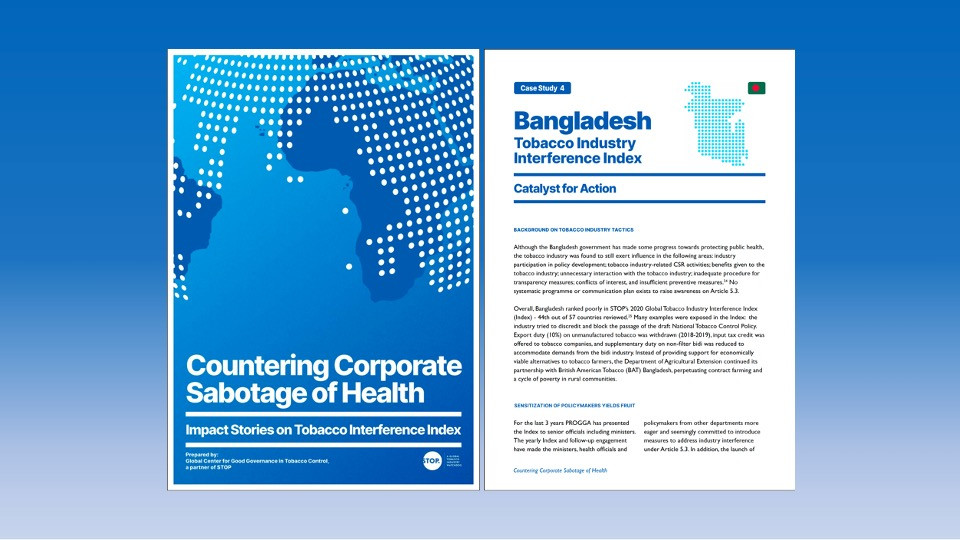Catalyst for Action

“For the last several years, support from GGTC has significantly boosted the battle of tobacco control and led to concrete achievements. Using Bangladesh’s Index and subsequent engagement with relevant authorities have resulted in sensitization of policymakers on interference issues, and also contributed to the denormalization of the tobacco industry.”
ABM Zubair
Executive Director, PROGGA, Bangladesh
Background on Tobacco Industry Tactics
Although the Bangladesh government has made some progress towards protecting public health, the tobacco industry was found to still exert influence in the following areas: industry participation in policy development; tobacco industry-related CSR activities; benefits given to the tobacco industry; unnecessary interaction with the tobacco industry; inadequate procedure for transparency measures; conflicts of interest, and insufficient preventive measures.[i] No systematic programme or communication plan exists to raise awareness on Article 5.3.
Overall, Bangladesh ranked poorly in STOP’s 2020 Global Tobacco Industry Interference Index (Index) - 44th out of 57 countries reviewed.[ii] Many examples were exposed in the Index: The industry tried to discredit and block the passage of the draft National Tobacco Control Policy. Export duty (10%) on unmanufactured tobacco was withdrawn (2018-2019), input tax credit was offered to tobacco companies, and supplementary duty on non-filter bidi was reduced to accommodate demands from the bidi industry. Instead of providing support for economically viable alternatives to tobacco farmers, the Department of Agricultural Extension continued its partnership with British American Tobacco (BAT) Bangladesh, perpetuating contract farming and a cycle of poverty in rural communities.
Sensitization of Policymakers Yields Fruit
For the last 3 years PROGGA has presented the Index to senior officials including ministers. The yearly Index and follow-up engagement have made the ministers, health officials and policymakers from other departments more eager and seemingly committed to introduce measures to address industry interference under Article 5.3. In addition, the launch of the Index is getting increasing media attention, resulting in larger number of media reports creating a greater ‘buzz’ with the findings.
Impact of the Index is visible. For example, in 2021 the Ministry of Industries (MoI) issued a new policy that prevents tobacco manufacturers and associated companies from receiving the prestigious President’s Award for Industrial Development (for which they had been previously selected in 2018 and 2019). PROGGA considers this as a significant leap towards thwarting interference and denormalization of the tobacco industry.[iii]
Mobilizing Civil Society Leaders to Influence Policy during COVID Pandemic
There has been unprecedented level of tobacco industry interference during the COVID-19 crisis.[iv] In April 2020, the two transnational tobacco companies operating in Bangladesh, BAT Bangladesh and Japan Tobacco International (JTI), secured special permission from the MoI which instructed all Divisional Commissioners and District Administrators (Deputy Commissioners) to ensure that the operation of these two companies run smoothly amid nationwide lockdown.
The MoI’s instructions to public officials attracted widespread criticism. On 7th May 2020, 100 eminent citizens in a joint statement, called for a temporary ban on the marketing and sale of all tobacco products during the COVID-19 pandemic to protect public health. Their letter to the Prime Minister was signed by renowned economists, former vice-chancellors of public universities, the former chief of the central bank, the former head of the revenue board, prominent journalists and leading health professionals, and gained significant momentum. This prompted the Ministry of Health and Family Welfare (MoHFW) to issue a letter to the MoI requesting the withdrawal of the special permissions and called for a temporary ban on tobacco production and sale during the COVID-19 outbreak. Although MoHFW's request was turned down, such a bold move from the Ministry that oversees tobacco control in Bangladesh is unprecedented.
The Tobacco Industry Interference Index, with ongoing technical support from the GGTC, has been unquestionably helpful in moving tobacco control issues forward in Bangladesh.
About PROGGA: PROGGA, Knowledge for Progress, is a Bangladeshi non-profit organization for research, advocacy, and capacity building that started its journey in 2008. Tobacco Control is one of the major areas of expertise of PROGGA. The Centre for Research and Advocacy to Fight Tobacco (CRAFT), a Bangladeshi tobacco industry monitoring observatory, is another initiative of PROGGA established in January 2020 with support from the WHO FCTC Secretariat through its Knowledge Hub for Article 5.3.
[i] ABM Zubair. Bangladesh Disqualifies Tobacco Companies from the President’s Award: A Welcome Step in the Right Direction. Posted on September 9, 2021 by Karen Evans-Reeves. Available from: https://bit.ly/3sX9YGG
[ii] ABM Zubair. Tobacco industry lobbies Bangladesh Government Agency to champion its business during COVID-19 pandemic. 3 July 2020. Available from: https://bit.ly/3NGXQBL
[iii]
STOP. Indicators of influence: Bangladesh. Available from: https://bit.ly/3tKEwfd
[iv] Assunta, M. Global Tobacco Industry Interference Index 2019. Global Center for Good Governance in Tobacco Control (GGTC). Bangkok, Thailand. 2020 Nov. https://bit.ly/3xVkbGC
